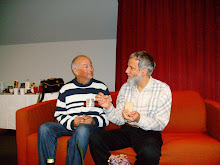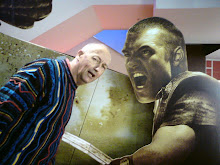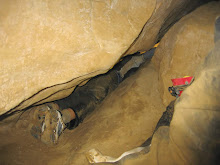As with many people of my age, I confess to having spent a good part of the 70s in the thrall of one man - his songs, his visual iconography, his stated philosophies on art, music and fashion, if not some of his deeper philosophical ideas - the man known as David Bowie.
The 70s belonged to Bowie. He owned them from start to finish, just as The Beatles and Stones had owned the 60s. You could rent part of the 7os if you were a lesser band/artist/musician, but you owed Bowie - and failure to acknowledge this could result in full debt being paid at a later date.
The total domination didn't begin straight away - it crept in with Space Oddity, a late 60s single, post-moon landing and 2001, and dealing with the tragic tale of Major Tom (check out earlier albums for more Gothic horror tales of unfortunate folk).
At this point, Bowie registered as a mildly offbeat freaky guy who could write interesting songs.
He followed up with The Man Who Sold the World, the album a pretty heavy rock adventure, as guitarist Mick Ronson began to influence/co-direct musical proceedings. Bizarrely, the title track became a huge hit for Lulu - she certainly had a knack for spotting a good song!
Hunky Dory is probably the first really "settled" album, in terms of overall tone and direction - Bowie plays around with the icons of the day, Dylan, Warhol, Velvet Underground (pretty alternative icons) and has a few gentle digs at the institution of marriage (Kooks) and 20th Century Alienation (Life on Mars, Changes - well, virtually all of his 70s stuff is literally or metaphorically about alienation).
And then Ziggy Stardust - the album cover reveals a strongly identifiable androgyne (Ziggy/Bowie) and the album itself explores character/plot/atmosphere in pretty much the way we would expect a movie to explore it. Bowie's stage shows were also becoming increasingly theatrical/narrative, setting a trend (Genesis keenly followed in his footsteps).
Important to note that the hits kept coming also - on this one we have Soul Love, Sufragette City, the title track...catchy, tightly-produced, verging on glam (Bowie virtually invented glam).
From Ziggy we move on to Aladdin Sane - the famous lightning bolt face paint as our visual reference, and even heavier rock creeping into the mix - the title track, Jean Genie, Drive in Saturday (pour me out another phone - what delightful surrealism!), Panic in Detroit - this is almost post-holocaust/disaster in the Western world. The sexuality issues continue to blur, Bowie states that he has borrowed a "cut-up" method of lyric writing (literally writing different lines, then cutting them up and splicing them together to get different linguistic relationships - hence the "poured phone", I suppose!) from William Burroughs (don't let your children near his books till they turn 18!). Features outstanding piano work from Mike Garson.
"Pinups" followed - with Bowie sharing the cover with super(thin)-model Twiggy, and challenging us to "spot the difference"...what a choice of originals to cover! 2 from the who, one from the kinks, and a superb, tightly arranged version of "See Emily Play", originally by Pink Floyd. The huge hit from this was Sorrow, featuring Bowie's "vulnerable" (aka "technically dismal") saxophone solo (VERY catchy - so Bowie is once again teaching us something about art v. technical quality - check out Brian Eno's experiments with the Bournemouth Sinfonietta around the same time).
"Diamond Dogs" takes us back into post-nuclear-holocaust land one last time, completing something of a trilogy, for all you sci-fi fantasy buffs who like things served in threes. This time cover-Bowie is not only transgender - he is trans-species (check out the paws). The music ranges from the rip-roaring title track (as close to a Stones riff as you could get without being accused of plagiarism - or closer??), through Philly Soul 1984 (a pointer for next album, whilst being darkly evocative of the present disaster), and into the expansive, grand melancholy of the Sweet Thing triptych (more threes, dear listeners!). Probably the most cohesive concept album of the 3 biggies, based loosely on Orwell's 1984 scenario - it scared me!
And then......well, David Live had given us quite a few musical clues, but here, with "Young Americans" was David in Frank Sinatra pose, using Luther van Dross (before he got big in both senses of the word) and David Sanborn (session saxman par excellence - not as "vulnerable" as our David!) and heaps of backing vocalists/session musicians to create a SOUL album!
Eh??
Cashing in??
Selling out??
No, not really, cos although the style is definitely soul, Bowie brings both a roughness to the production and a scary intelligence to the lyrics - Young Americans is a heartbreaking tale about the loss of the American Dream (yes, Nixon gets a mention), and how it really is much easier to keep on chugging along in the same old rut. There are also the collaborations with John Lennon, adding significance beyond the mere recorded work.
"Station to Station" followed, with soul references to be found still in "Golden Years" (fantastic dance single) and "Stay" - a little bit of Gothic Horror in TVC15 (yes, a TV eats his girlfriend), epic heavy rock/prog with the title track (I heard this live in 78 in Western Springs - phenomenal), and the beautiful songs Word on a Wing and Wild is the Wind (probably one of his best vocal performances ever - and do check out the official video of it and the live BBC studio performance).
Still setting trends and creating the iconic imagery to go with it...this is Bowie's Thin White Duke phase...the photo is from the movie he starred in (as an alien, of course!), The Man Who Fell To Earth (a good film, though very sad)...he had hit some very hard times personally, incoroporating an addiction to cocaine, and it was wondered around the world as to what would happen next - was this where Mr Bowie signed off?
1976/7.
Van Morrison acts like punk never happened.
Led Zeppelin continue to act as rock gods/dinosaurs.
Queen bring out the leather jackets and let John Deacon's basslines dominate for a while.
And Bowie meets up with Mr Brian Eno, gets another haircut (tho also a photo from the sci-fi movie, now in ORANGE), and sets TWO more musical trends, with one side per vinyl album to showcase each. The magic of "Low".
Side A has a savage, spiky rock band with sharp noise and colours punctuating it. Sound and Vision, the lead single, would have rated as soul/r'n'b in a parallel universe, but we are not in a parallel universe, and so, complete with vulnerable/nasty sax and a drum sound to shiver the timbers of any pirates, we find ourselves mysteriously interrogated about OUR values - "don't you wonder sometimes 'bout sound and vision?" Well, don't ya, punk?.....
Other singles include "Be My Wife" with a bit of jelly-roll piano thrown in and "Breaking Glass" (how could the punks possibly have issues with a bloke who comes out with the line "don't look at the carpet - I've done something awful on it"???).
This side's songs are all way below mainstream timelengths - this was an issue for punks, who rallied against prog, but also the idea of instrumental solos and songs that milked their choruses without contributing new ideas.
To side B...almost conclusive evidence of either schizophrenia OR genius (or both?).
I wonder what the punks (the real ones) would have made of this? They would have been quite lost possibly, as in fact many of us were on first hearing...Side B is a set of 4 minimalist instrumentals, seemingly heavily influenced by Eno, who had been experimenting with Ambient Music, but with probably a little more harmonic and melodic drive than what Eno had produced at the time. This trend was to become huge and created a bridge between classical and pop music, mixing up labels and definitions in a chaotic and healthy way...later, Phillip Glass, avante garde classical composer, wrote a Low and a Heroes symphony (check this!), using the Bowie/Eno themes and expanding the structures.
The musical relevance continued - in 78 we were treated to "Heroes", another collaboration with Eno (and another cut-up lyrics collection). The title track is widely regarded as one of Bowie's best, detailing the thoughts and feelings of a couple separated by the Berlin Wall (was Bowie responsible for the wall's destruction? - hey, he's good but not THAT good!)...musically impressive as Bowie's vocals leap up an octave for the last 2 or 3 verses and we realise he really really wants to get to his girl!
As with Low, the album has 2 distinct sides to it - vocal and instrumental. Bowie's sax is brought in to evoke pterodactyls at dawn on the song Neukoeln.
As with Low, the album was recorded in Berlin at Hansa-by-the-wall studios, allowing Bowie to soak up the atmosphere and clearly giving him renewed creative stimulus (he also produced Iggy Pop's "comeback" albums, The Idiot and Lust For Life, here). The cover is black and white, with Bowie in a mysterious pose - classic, but mysterious.
And this is where my story ends - the story of a man and his work throughout the course of a decade - incredidably staying ahead of the pack for the length of that decade, influencing soundscapes and visual iconography for that decade (and beyond) whilst seemingly walking his own road - though choosing high quality collaborators at each stage, both in terms of musicians and producers, there is no doubt that he made the final call on the creative issues.
What followed - Lodger, Scary Monsters, Let's Dance - continued the incredible commercial success, so we could be greedy and say Bowie dominated the early 80s also, but we would start to get into issues of commercialiasm, recycling, self-parody (can we ever forgive the curly perm on the Let's Dance tour??) and the tail wagging the dog...suffice to say, Bowie survived the 80s and 90s and continues to produce wonderful music - the Bowie Dynasty had ended, however...
But can I suggest, as a PS, that you check out the videos of him with Arcade Fire, performing Five Years (from Ziggy Stardust) and Wake Up (from Arcade Fire's Funeral)?
Tremendous!
Signing off,
Bowie Appreciationist,
Gerald.
(shout out to Kerry L, who suggested doing this!)
Subscribe to:
Post Comments (Atom)







































No comments:
Post a Comment